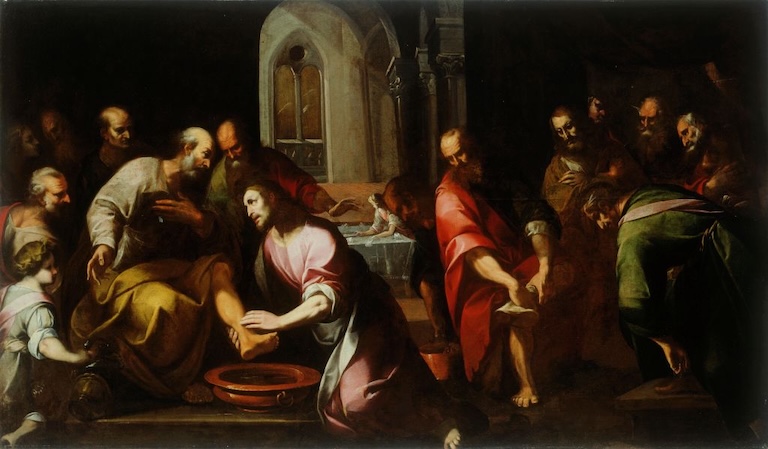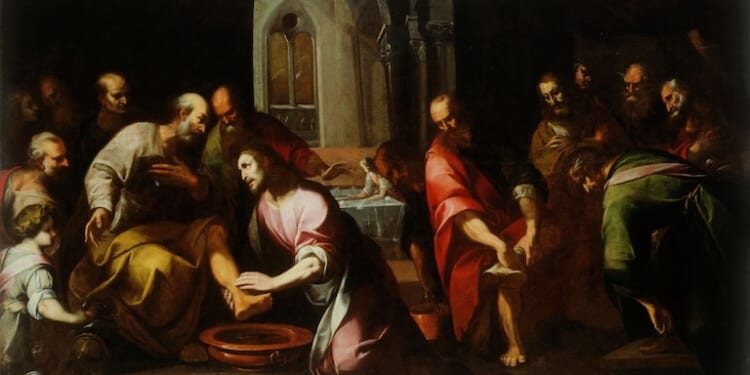“Thank God I’m not like that Pharisee!” Now, if that’s your response to today’s Gospel (Luke 18:9-14), then you probably missed the point. Because there’s more than a bit of the Pharisee in each of us, and not enough of the tax collector. Our Lord presents the parable as two different men in the Temple of Jerusalem. But it might as well be two different men within each of us. They represent the battle between pride and humility that rages in our souls.
Pride is the inordinate focus on self. We typically associate it with haughtiness, the exaltation of self we see in the Pharisee. But that’s only one manifestation of it. What’s at the heart of pride is the self-referential thinking that turns a man in on himself (Incurvatus in se) and renders him incapable of opening to God and grace.
So, pride isolates. Notice how the Pharisee is incapable of an authentic conversation with God. His prayer is self-focused and about his own virtues. It’s not about God or God’s goodness. In fact, it isn’t even to God. He speaks the prayer “to himself.” That line is a rich description of how spiritually crippling pride is. It traps us in ourselves, prevents us from going out and genuinely speaking with God or anyone else. It also prevents anyone from getting through to us to administer a necessary correction.
The only outward thinking of the proud is to compare themselves to others. The Pharisee finds a foil in the tax collector and thus feels good about himself. Worse, he thinks that he is pleasing to God because he’s better than another. In comparison to the lesser man, he can stand tall and proud in his prayer. But in so doing, he constructs his own prison. He’s chained himself and his self-worth to being better than the other. This is what we call vainglory. It’s a useless satisfaction because it rests not on the truth but on comparison.
And the comparison could have worked out differently. The Pharisee could have encountered someone better, someone who fasts and tithes even more than he does. What then? For a man so self-focused, it would have meant discouragement and despondency. His peace is so caught up with being better than others, that being less would unnerve him.
This, too, is a manifestation of pride, to think that we are displeasing to God because others are better than we are. For it is still an excessive focus on self instead of on God’s love for us. It’s the same error as the haughty, but with a different result.

The error is comparison. That the Pharisee finds himself better than others is, in a sense, incidental. The real spiritual cancer is the constant comparison he always makes. Remember Uncle Screwtape’s counsel: “To be” means to be in competition. The Pharisee finds his worth only in comparison to others, never in light of God’s love for him. What matters – what gives him worth – is not God’s love but his being better than others. And had it worked out differently, discouragement would have overwhelmed him.
Comparison is the thief of joy. That old line contains a lot of wisdom. The man who finds his worth only by comparison to others will be haughty when he’s better than they and discouraged when he’s not. Those are simply two sides of the same pride coin. Another variation is to think ourselves failures for not meeting our own self-focused standards instead of receiving the love that God extends and finding our worth in His estimation of us. The proud set the terms for their being loved instead of receiving what God extends. They grasp for what He wants to give.
Pride is slavery. Humility is freedom. “[T]he tax collector stood off at a distance and would not even raise his eyes to heaven but beat his breast and prayed, ‘O God, be merciful to me a sinner.’” To our culture, this must seem tremendously unhealthy. He would be accused of low self-esteem.
In fact, his humility opens the door to a genuine conversation with God. Unlike the Pharisee, he’s praying to God not to himself. Prayer is the first fruit of humility, a speaking to God not as a self-made man but as one dependent on God and joyful about it.
Humility is freedom because it is truth. It is the right appraisal of ourselves and of our relationship with God. The tax collector knows the foundational reality: we are sinners and God is the Savior. Humility is to see ourselves as we are, to acknowledge our gifts, our failures, our complete dependence on God. It receives instead of grasping.
And humility frees us from the trap of comparison. The humble man knows his dignity and worth come from God. He has no fear about whether or how he stacks up against others. He is not puffed up if better than others, nor discouraged if worse. He can rejoice.
The tax collector’s simple gesture has become part of the Mass. We strike our breasts in repentance. We come before God, not as self-righteous in need of no one, but as sinners in need of mercy. The placement of that act of humility at the beginning of Mass is significant. It tills the soil of our souls so that we can receive first God’s Word and then His Body.











